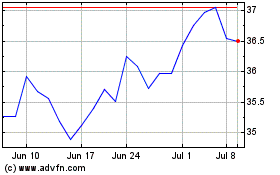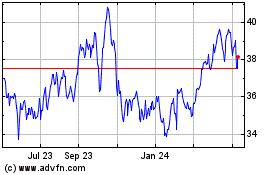Shell Issues Warning on Buyback, Debt Efforts -- WSJ
November 01 2019 - 3:02AM
Dow Jones News
By Sarah McFarlane
This article is being republished as part of our daily
reproduction of WSJ.com articles that also appeared in the U.S.
print edition of The Wall Street Journal (November 1, 2019).
LONDON -- Royal Dutch Shell PLC said it may have to slow down a
share-buyback commitment it made to investors after a big natural
gas deal -- the latest sign of pressure on Big Oil amid lower crude
and gas prices.
Oil companies have traditionally rewarded investors richly --
and reliably -- via dividends and buybacks, even amid volatile
commodities prices. The steady payouts, though, have become harder
to sustain after a prolonged period of lower oil prices, following
a collapse from over $100 a barrel five years ago, to around $60
now.
BP PLC Chief Financial Officer Brian Gilvary added to investor
unease earlier this week when he suggested the company was unlikely
to raise its dividend in the fourth quarter, while it focused on
paying down debt. After BP shares fell, the company issued a
statement the next day to clarify that it had yet to decide on the
fourth-quarter payout.
Shell on Thursday said it still intends to buy back $25 billion
worth of shares -- a promise it made after its $50 billion
acquisition of U.K. natural gas giant BG Group in 2016 -- but that
it may now take longer to reach that figure. So far Shell has
completed $12 billion of buybacks. It had planned to finish the
program by 2020, but now thinks lower energy prices make that
timing uncertain.
Shell also said market conditions may make its plan to reduce
its debt-to-equity ratio to under 25% more difficult. Debt
currently stands at about 28%.
"The prevailing weak macroeconomic conditions and challenging
outlook inevitably create uncertainty about the pace of reducing
gearing to 25% and completing the share buyback program within the
2020 time frame," Chief Executive Ben van Beurden said in a
statement.
The caution prompted Shell's B class shares to trade 3.7%
lower.
When Shell committed to the share buyback plan it had assumed
$65 a barrel oil in 2019 and stronger chemical and refining
margins, Chief Financial Officer Jessica Uhl said on the company's
earnings call. The reality of lower oil and gas prices and weaker
margins, if they persist, "translates into an eight to nine billion
dollar impact on our cash in 2019-20," said Ms. Uhl.
Shell will now have to decide whether to slowdown the share
buyback to maintain a robust balance sheet, or keep purchasing
stock at the expense of higher debt. Shell didn't indicate whether
it might prioritize one over the other.
"Common sense suggests the balance sheet is much more important
than an arbitrary target on the buyback," said Biraj Borkhataria,
co-head of European energy research at RBC Capital Markets.
The caution on buybacks came as Shell reported third-quarter
results that outperformed peers like BP PLC and Total SA, whose
earnings were hurt by weaker oil and gas prices.
The Anglo-Dutch oil giant reported profit on a net current
cost-of-supplies basis -- -a figure similar to the net income that
U.S. oil companies report -- for the three months ended Sept. 30 of
$6.08 billion, compared with $5.57 billion in the year-earlier
period.
Downstream results for all three European majors were better
than analysts expected, however, with BP citing high utilization of
its refining capacity and Shell noting strong trading revenue.
Exxon Mobil Corp. and Chevron Corp. are due to report results on
Friday.
Write to Sarah McFarlane at sarah.mcfarlane@wsj.com
(END) Dow Jones Newswires
November 01, 2019 02:47 ET (06:47 GMT)
Copyright (c) 2019 Dow Jones & Company, Inc.
BP (NYSE:BP)
Historical Stock Chart
From Mar 2024 to Apr 2024

BP (NYSE:BP)
Historical Stock Chart
From Apr 2023 to Apr 2024
